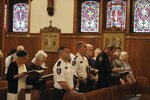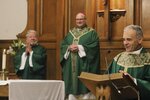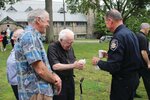


WAKEFIELD —On Sunday, June 25, the third annual Mass of Thanksgiving to God for All Essential Workers was offered at St. Francis of Assisi Parish. This special occasion comes in the aftermath of the events surrounding the Covid-19 pandemic to honor and pray for essential workers and all those who suffered from the physical, psychological or economic effects of Covid.
Bishop Richard G. Henning, served as the principal celebrant with concelebrants Father Albert Ranallo, pastor of St. Francis of Assisi and coordinator of Pastoral Care for Healthcare Facilities for the diocese, and Father Eugene McKenna, Pastor Emeritus of St. Lucy, Middletown.
In attendance were many first responders, healthcare workers, those currently or formerly in the military and those involved with transportation. Essential workers processed in and were honored by Father Ranallo in opening remarks, who thanked them for all that they do in service to the larger community.
Bishop Henning began his homily by pointing to his own personal experiences with the first responder community.
“My father and my uncle both spent decades in the fire department of the City of New York. My mother was a Navy nurse at the New York family hospital. I grew up in a household where it was normal that you were supposed to do for others,” said Bishop Henning, noting that many of his close family members exemplified what he called a “daily heroism,” something which manifested itself in a desire to serve others.
Citing the example of his father, Bishop Henning noted that a life of service was considered “its own reward,” an attitude that the he took with him in his ministry as a priest and later a bishop.
In his homily, he went on to say that Christ exemplifies to the greatest degree a spirit of self-giving love, stating that Christ knows and cares for each of us as individual persons.
“When he says that the Lord is concerned even for the fallen sparrow, and that every hair on your head is counted, that’s not empty rhetoric. This is the way in which Jesus ministers in his life, and it’s certainly the way in which he offers himself for our redemption on the cross.”
The Christian life is defined by a striving to imitate the self-giving love of Christ, something that was made difficult by the isolation caused by the pandemic.
“When times are tough, our usual human instinct is to come together and help one another. But Covid drove us apart. Fear drove decision-making and personal actions in ways that we recognize now have caused lasting harm and that require healing,” Bishop Henning said.
“In the midst of all of that chaos and fear and isolation, there were men and women who stepped into the breach. They were redeemers, in a very real sense for us in a very difficult time.”
Many of those present were pleased to hear the bishop’s sentiments.
“It was a beautiful Mass,” said Kathleen McKeon, who organized the day’s events, saying that she was particularly moved by Bishop Henning’s emphasis on “the wonderful example that everybody gave us during Covid.”
“We come together during an emergency, but this one [Covid] did pull us apart, because of the fear,” McKeon noted, pointing to the growing numbers of studies showing the negative psychological effects that the social isolation brought about by the pandemic had on society.
Yet, McKeon also pointed to the fact that these same destructive forces also provided an opportunity for the light of human selflessness to shine forth.
“I think one lasting effect of the pandemic is the incredible witness that essential workers provided to all of us,” said McKeon.
“I hope we all remember that these folks are still out there doing wonderful things every day!”
The need for gratitude was also something emphasized by Bishop Henning in remarks made to Rhode Island Catholic after Mass.
“I think one of the things we can learn from the pandemic is the need to say, ‘Thank you,’” the bishop said.
Raymond Quirk, a parishioner of St. Francis of Assisi, was very happy that the bishop visited St. Francis of Assisi to acknowledge the essential workers.
“There’s a lot of people behind the scenes that don’t get to be recognized a lot of times, but they provide a lot of service to us,” he said.
Quirk, a retired police officer for the Cranston Police Department who currently works with the Division of Sheriffs, was not only glad to see essential workers honored during the Mass, but also saw events such as these as an opportunity to overcome the isolation caused by the pandemic, which he sees as having both a practical and a spiritual element to it.
“With the isolation, it has been a little over three years since the pandemic started, and it takes a lot to get people back,” Quirk said. “People may have drifted away from the Church. It could be a time to say, ‘Let’s get together.’ Invite somebody back and increase participation in parishes and churches around our state.”